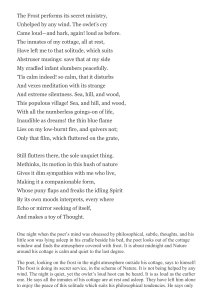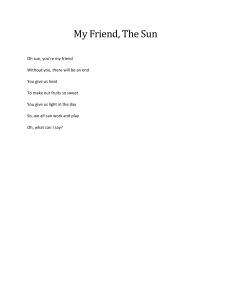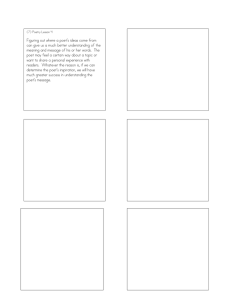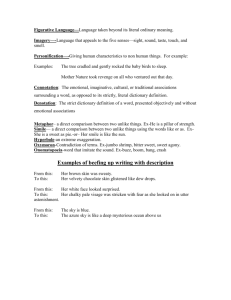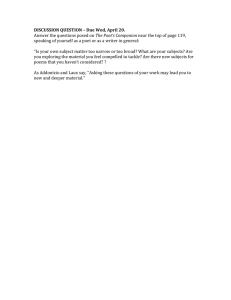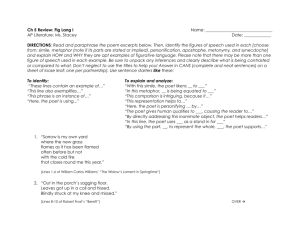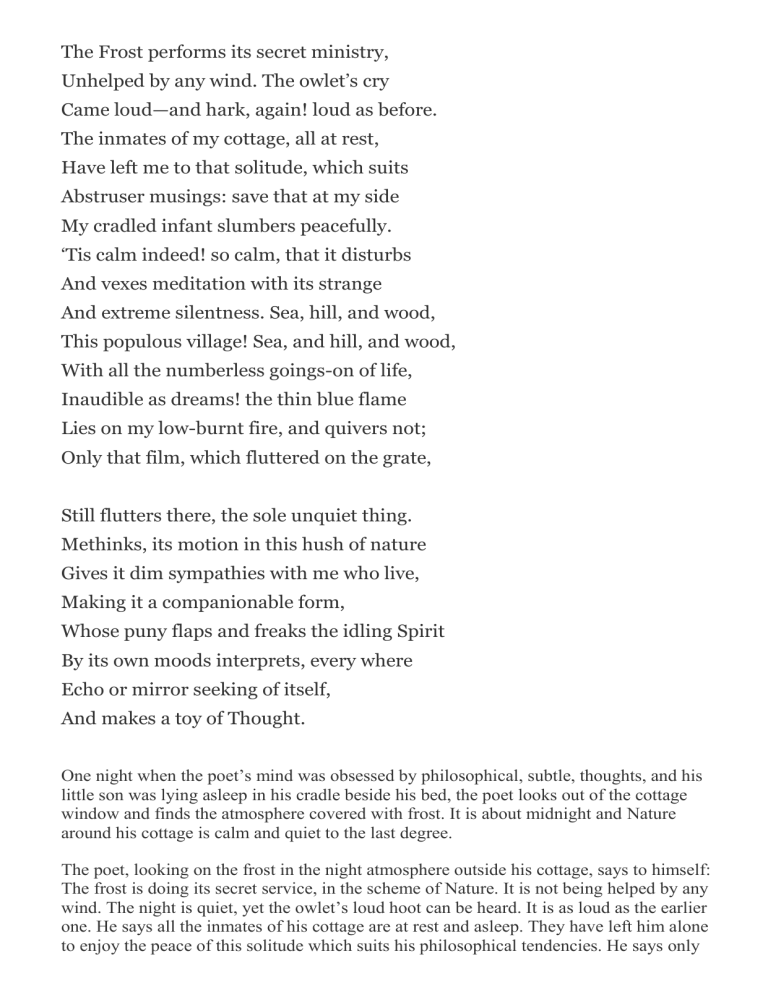
The Frost performs its secret ministry, Unhelped by any wind. The owlet’s cry Came loud—and hark, again! loud as before. The inmates of my cottage, all at rest, Have left me to that solitude, which suits Abstruser musings: save that at my side My cradled infant slumbers peacefully. ‘Tis calm indeed! so calm, that it disturbs And vexes meditation with its strange And extreme silentness. Sea, hill, and wood, This populous village! Sea, and hill, and wood, With all the numberless goings-on of life, Inaudible as dreams! the thin blue flame Lies on my low-burnt fire, and quivers not; Only that film, which fluttered on the grate, Still flutters there, the sole unquiet thing. Methinks, its motion in this hush of nature Gives it dim sympathies with me who live, Making it a companionable form, Whose puny flaps and freaks the idling Spirit By its own moods interprets, every where Echo or mirror seeking of itself, And makes a toy of Thought. One night when the poet’s mind was obsessed by philosophical, subtle, thoughts, and his little son was lying asleep in his cradle beside his bed, the poet looks out of the cottage window and finds the atmosphere covered with frost. It is about midnight and Nature around his cottage is calm and quiet to the last degree.00:3101:04 The poet, looking on the frost in the night atmosphere outside his cottage, says to himself: The frost is doing its secret service, in the scheme of Nature. It is not being helped by any wind. The night is quiet, yet the owlet’s loud hoot can be heard. It is as loud as the earlier one. He says all the inmates of his cottage are at rest and asleep. They have left him alone to enjoy the peace of this solitude which suits his philosophical tendencies. He says only his cradled little son is sleeping beside him peacefully. The poet further says that the night atmosphere is so calm that its strange, extreme, silence disturbs his thoughtful mind, through its strangeness. The sea, the hill, the wood, and the village of countless activities of human life all are as silent as dreams. Even the thin blue flame seems to be asleep and still on his slowly dying fire. The poet says in this silence of Nature, its motion reflects its silent sympathy with him who is still awake and look upon it as an agreeable form. His unoccupied spirit interprets its little capricious movements in the light of its own moods. For it seeks its echo or reflection everywhere and plays with a thought as if it were a plaything. ِ يٓذًٙح َحت ًًح فٛش يغطهقٛ ٔكحٌ جذُّ جنصغ، قسٛس ٔجنذقٛ ػُذيح كحٌ ػقم جنشحػش يٕٓٔعًح ذحألفكحس جنفهغفٙحنٛ ئقذٖ جنهٙف غٛؿذ جنغالف جنؿٕ٘ يغطٗ ذحنصقٚٔ سُٛظش جنشحػش يٍ جنُحفزز جنًُضنٚ ، ِشٚذؿٕجس عش. ؼسٛم ٔجنطرٛ يُطصف جنهٙقٕجن شزٛقٕل كٕخّ ْحدتس ْٔحدتس قطٗ جنذسؾس جألخ. ٙ ف، سٚقٕو ذخذيطّ جنغشٚ غٛ جنصق:ّقٕل نُفغٚ ، ٙفٚ خحسؼ جنًُضل جنشٙهٛ جنؿٕ جنهٙغ فُٛظش ئنٗ جنصقٚ ٘ جنز، جنشحػش ؼسٛيخطظ جنطر. حـٚغحػذْح جنشٚ ال. ًٙكٍ عًحع صٕش جنرٕيس جنؼحنٚ ٍ ٔنك، م ْحدبٛجنه. ئَّ يشضفغ يػم جنغحذق. قٕلٚ قحنس سجقس َٕٔوٙغ َضالء كٕخّ فًٛأٌ ؾ. سٕٛنّ جنفهغفٛ ضُحعد يٙنقذ ضشكِٕ ذًفشدِ نهطًطغ ذغالو ْزِ جنؼضنس جنط. قٕلٚ ُحو ذؿحَرّ ذغالوٚ ش جنًٓذب فقظٛأٌ جذُّ جنصغ. دٚ ْحدب نذسؾس أٌ صًطّ جنغشٙهٛقٕل جنشحػش كزنك أٌ جنؿٕ جنهٚ ّضػؽ ػقهّ جنًذسٔط يٍ خالل غشجذطٚ ٔجنًططشف. س كهٓح صحيطس يػم جألقالوٚحز جنرششٛ ال ضؼذ ٔال ضكصٗ نهكٙس جألَشطس جنطٚجنركش ٔجنطم ٔجنخشد ٔقش. قطٗ جنشؼهس قس ضرذٔ َحتًس ٔال ضضجل يشطؼهس ذرظءٛجنضسقحء جنشق. ضؼكظ قشكطّ ضؼحطفّ جنصحيص، ؼس ْزجٛ صًص جنطرٙقٕل جنشحػش فٚ ّ كشكم يقرٕلُٛظش ئنٚٔ قظًحٛضجل يغطٚ يؼّ جنز٘ ال. ضٕءٙشز فٛس جنصغٚٔش جنًشغٕنس قشكحضّ جنُضٛضفغش سٔقّ غ يضجؾّ جنخحص. هؼد يغ فكشز كًح نٕ كحَص نؼرسٚٔ ٌ كم يكحٙركع ػٍ صذٖ أٔ جَؼكحط فٚ َّأل. But O! how oft, How oft, at school, with most believing mind, Presageful, have I gazed upon the bars, To watch that fluttering stranger ! and as oft With unclosed lids, already had I dreamt Of my sweet birth-place, and the old church-tower, Whose bells, the poor man’s only music, rang From morn to evening, all the hot Fair-day, So sweetly, that they stirred and haunted me With a wild pleasure, falling on mine ear Most like articulate sounds of things to come! So gazed I, till the soothing things, I dreamt, Lulled me to sleep, and sleep prolonged my dreams! And so I brooded all the following morn, Awed by the stern preceptor’s face, mine eye Fixed with mock study on my swimming book: Save if the door half opened, and I snatched A hasty glance, and still my heart leaped up, For still I hoped to see the stranger’s face, Townsman, or aunt, or sister more beloved, My play-mate when we both were clothed alike! In the second stanza, the mind of the poet travels back to past, being stirred by the associations of the thin film of light. He remembers that at Christ Hospital School, he would look on the fireplace in expectation of that thin film of light. He believed that the film was a sign of a visitor to see him next morning. He says, and often, having seen that film, he was filled with the sweet vision of his birth-place, and of the old church-tower whose bells produced the only music for the poor men of the place. Those bells rang from morning to evening on a hot fair-day. They rang so sweet that even their memory at school moved his being and filled him with a passionate joy. He says their tinkling sounds fill on his ears like the clear sounds of prophecy of future events. So, he kept looking over that film and imagined sweet things till he fell asleep, and sleep prolonged his sweet dreams. Next morning, his mind would become occupied with the thoughts of the visit of his some friends or relatives. Being afraid of the stern school master, he would also pretend to be reading, and fixed his eyes on his book. But his thoughts were concerned with the expectation of a visitor. So the words in the book would just swim before his eyes. If the door opened a little, he would hastily cast a glance at it. His heart would leap up in excitement. And he would expect to see the expected visitor’s face. He hoped to see a townsman, an aunt, a beloved sister, or a playmate of childhood days when they were dressed alike. ق نهضٕءٛهى جنشقٛقٕدِ جضكحدجش جنفٚٔ ، ٙؼٕد ػقم جنشحػش ئنٗ جنًحضٚ ، َٙ جنًقطغ جنػحٙف. يذسعسٙطزكش أَّ فٚ ق ْزجٛهى جنضٕء جنشقُٛظش ئنٗ جنًٕقذ ضٕقؼًح نفٚ ٌ كح، فٛيغطشفٗ جنًغ. ّطٚهى كحٌ ػاليس ػهٗ صجتش نشؤٛؼطقذ أٌ جنفٚ ٌكح ٕٙو جنطحنٛصرحـ جن. ٘ى جنزٚغس جنقذُٛ ٔذشؼ جنك، ِالدٛهس نًكحٌ يًٛس جنؿٚثح ذحنشؤٛ كحٌ يه، هىٛشج يح شحْذ جنفٛ ٔكػ، قٕلٚ ٌذز نفقشجء جنًكحٛقٗ جنٕقٛأَطؿص أؾشجعّ جنًٕع. ٕو ػحدل قحسٚ ٙسٌ ضهك جألؾشجط يٍ جنصرحـ ئنٗ جنًغحء ف. َّحٛ جنًذسعس قشكص كٙنقذ سَّٕج قطٗ أٌ رجكشضٓى ف سٛٔأيألضّ ذفشقس ػحطف. سّٛ يػم جألصٕجش جنٕجضكس نُرٕز جألقذجظ جنًغطقرهٍَٛ ضًأل أرَٛقٕل ئٌ أصٕجش جنشٚ. ، نزنك ٔأطحنس جنُٕو أقاليّ جنكهٕز، حء قهٕز قطٗ أَّ َحوٛم أشٛهى ٔضخٛ جنُظش ئنٗ ْزج جنفٙجعطًش ف. ، ٕٙو جنطحنٛ صرحـ جنٙف ّحسز ذؼض أصذقحتّ أٔ أقحسذٚصرف ػقهّ يشغٕالً ذأفكحس صٛع. ّّ ػهٗ كطحذُٛٛ ٔػهق ػ، ضًح ذحنقشجءزٚطظحْش أٚ ٌ كح، ذ جنًذسعس جنصحسيسٛخٕفًح يٍ ع. س ذطٕقغُٛنكٍ أفكحسِ كحَص يؼ صجتش. ُّٛٛ جنكطحخ ضغرف أيحو ػٙنزج فاٌ جنكهًحش ف. َظشز ػهٗ ػؿم ػهٗ ػؿمٙهقٚ َّ فا، ًالٛئرج فطف جنرحخ قه. ّكحٌ قهر ً جإلغحسزٙقفض فٚ. شٖ ٔؾّ جنضجتش جنًطٕقغٚ ٌطٕقغ أٚٔ. الٛصي ٔ أ، أٔ أخطًح يكرٕذًح، أٔ ػًس، شٖ يٕجطًُحٚ ٌأيم أٚ ٌكح شضذٌٔ يالذغٓى ػهٗ قذ عٕجءٚ حو جنطفٕنس ػُذيح كحَٕجٚ أٙف Dear Babe, that sleepest cradled by my side, Whose gentle breathings, heard in this deep calm, Fill up the intersperséd vacancies And momentary pauses of the thought! My babe so beautiful! it thrills my heart With tender gladness, thus to look at thee, And think that thou shalt learn far other lore, And in far other scenes! For I was reared In the great city, pent ‘mid cloisters dim, And saw nought lovely but the sky and stars. But thou, my babe! shalt wander like a breeze By lakes and sandy shores, beneath the crags Of ancient mountain, and beneath the clouds, Which image in their bulk both lakes and shores And mountain crags: so shalt thou see and hear The lovely shapes and sounds intelligible Of that eternal language, which thy God Utters, who from eternity doth teach Himself in all, and all things in himself. Great universal Teacher! he shall mould Thy spirit, and by giving make it ask. In this stanza, the poet again turns his attention to his little son asleep in the cradle, and tells that dear baby, your gentle breathing are audible in this deep silence. He tells his little son that they fill up the spaces of his vacant moods and also those of the momentary pauses in his thoughts. He says that he was brought up in the great city of London; he was obliged to live in rooms of dim light, and so saw nothing beautiful except the sky and the stars. But, you, my baby son, shall be brought up here in the countryside. Here you shall wander as freely as the breeze, along lake-margins and sandy beaches, beneath the steep, rugged, rocks of ancient hills, and clouds which by virtue of their vast, pliable gases, put on the shapes of lakes, seas, and rugged rocks. Thus, you, my child, shall see the lovely shapes and hear the intelligible sounds of Nature’s eternal language uttered by God: He lives in eternal Heaven, yet reflects Himself in all things and creatures. He also contains all things in Himself. As Nature, he is the great universal teacher to living creatures: He shall mould your spirit through his influences. He shall give you Nature sweet company whose delights make you ask for more and more. ضُفغك، ضٚخرش أٌ جنطفم جنؼضٚٔ ، جنًٓذٙش َحت ًًح فٛكٕل جنشحػش جَطرحّْ يشز أخشٖ ئنٗ جذُّ جنصغٚ ، ْزج جنًقطغٙف قًٛ ْزج جنصًص جنؼٙف يغًٕع فٛجنهط. ضًح فطشجش جنطٕقفٚش أَٓح ضًأل يغحقحش يضجؾّ جنشحغشز ٔأٛخرش جذُّ جنصغٚ ِ أفكحسٙجنًإقص ف. ًسُٛس نُذٌ جنؼظٚ يذٙقٕل أَّ َشأ فٚ. ثًحٛش شٚ نزنك نى، غشف يٍ جنضٕء جنخحفصٙش فٛجضطش نهؼ ً . فٚ جنشٙطك ُْح فٛ عططى ضشذ، شٛح ٔنذ٘ جنصغٚ ، أَص، ٍٔنك. س يػمُْٚح عٕف ضطؿٕل ذكش ال عٕٖ جنغًحء ٔجنُؿٕوًٛؾ ٕٙو جنطٛ ٔجنغ، ذز جالَكذجسًٚس شذٚ ضكص صخٕس جنطالل جنقذ، سٛشز ٔجنشٕجطة جنشيهٛ ػهٗ طٕل ْٕجيش جنرك، ىٛجنُغ ٔجنصخٕس جنٕػشز، شجش ٔجنركحسٛ ضٕضغ ػهٗ شكم جنركٙ جنط، ذككى غحصجضٓح جنشحعؼس جنًشَس. َّ ئ: َطق ذٓح هللاٙؼس جنطٛس نهطرٚهس ٔضغًغ جألصٕجش جنٕجضكس نهغس جألذذًٛ عطشٖ جألشكحل جنؿ، ٘ح ٔنذٚ ، أَص، ْٔكزج حء ٔجنًخهٕقحشٛ كم جألشٙؼكظ َفغّ فٚ ُّ ٔنك، سٚ جنغًحء جألذذٙش فٛؼٚ. ٙحء فٛكطٕ٘ ػهٗ كم جألشٚ َّكًح أ َّفغ. ّشجضٛصٕؽ سٔقك يٍ خالل ضأغٛ ع:سٛى نهًخهٕقحش جنكٛ جنؼظًٙ ْٕ جنًؼهى جنؼحن، ؼسٛذحػطرحسِ جنطر. ٌؿد أٚ ك ششكسٛؼطٚ Nature Sweet ذٚذ ٔجنًضٚ ضؿؼهك يغشجضك ضطهد جنًضٙجنط. Therefore all seasons shall be sweet to thee, Whether the summer clothe the general earth With greenness, or the redbreast sit and sing Betwixt the tufts of snow on the bare branch Of mossy apple-tree, while the night-thatch Smokes in the sun-thaw; whether the eave-drops fall Heard only in the trances of the blast, Or if the secret ministry of frost Shall hang them up in silent icicles, Quietly shining to the quiet Moon. In this final stanza of the poem, the poet says that he will rear him that is Hartley Coleridge in the open atmosphere of Nature. The objects of Nature will cast their influences on him. They will also be his object-lessons. For Nature is a great teacher to mankind. She will shape and develop his personality in the natural manner. In Nature’s lap, Hartley will come to love all the seasons for the sake of their individual gifts and characteristics. He will also love the time when rain-drops fall from the caves, or when such water drops are frozen by the frost and seen hanging from the edges of the thatched-cottage roof, in the quiet moonlight. عطهق. ٙفْ ٙزج جنًقطغ جألخٛش يٍ جنقصٛذز ٚ ،قٕل جنشحػش أَّ عٕف ٚشذ ٙنّ ْحسضه ٙكٕنٛشدؼ ف ٙؾٕ جنطرٛؼس جنًفطٕـ عطشكم .ألٌ جنطرٛؼس يؼهى ػظٛى نهرششٚس .عٛكٌَٕٕ أٚضًح دسٔعًح ف ٙيٕضٕػّ .كحتُحش جنطرٛؼس ضأغٛشْح ػهّٛ .ذحنطشٚقس جنطرٛؼٛس شخصٛطّ ٔضطٕس عٛكد أٚضًح جنٕقص جنز٘ ضغقظ .ف ٙقضٍ جنطرٛؼس ،عٛكد ْحسضه ٙكم جنًٕجعى يٍ أؾم يٕجْرٓى ٔخصحتصٓى جنفشدٚس ف ّٛقطشجش جنًطش يٍ جنكٕٓف ،أٔ ػُذيح ٚطى ضؿًٛذ قطشجش جنًحء ْزِ ذغرد جنصقٛغ ٔسؤٚطٓح يؼهقس يٍ قٕجف عقف جنًُضل جنشٚف ٙف ٙضٕء جنقًش جنٓحدب
